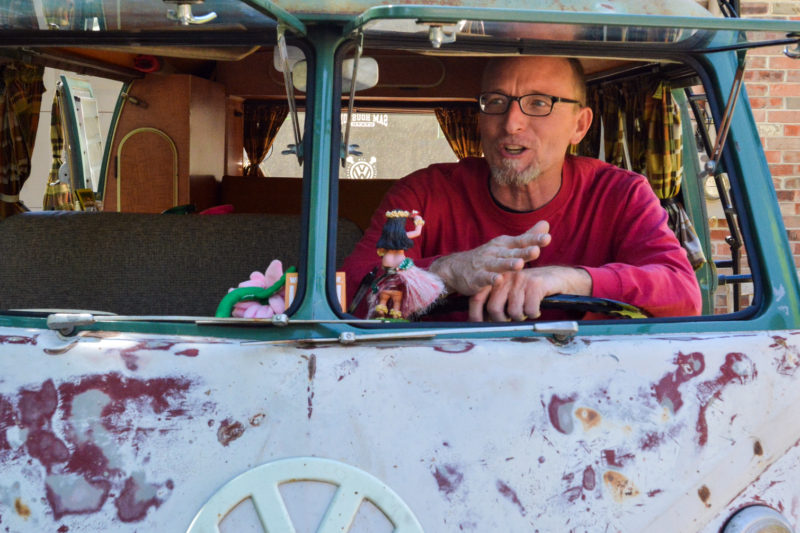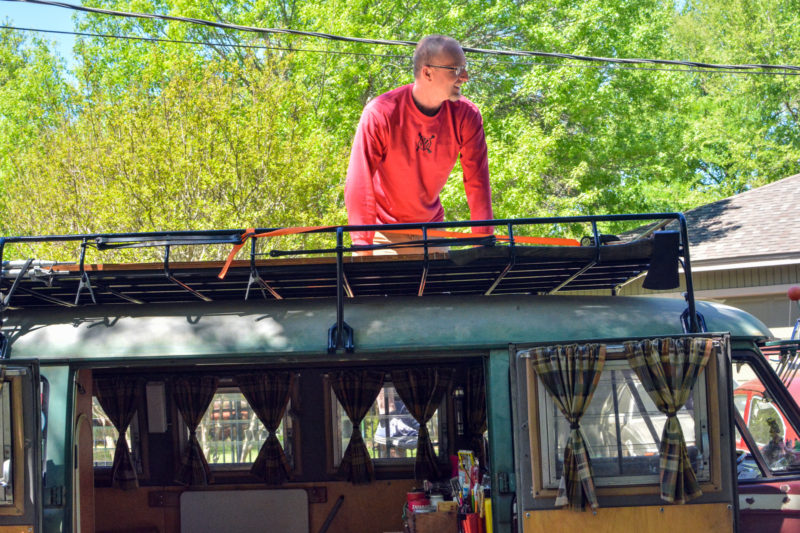Austin’s VW Bus Guru Brings the People’s Vehicle Back to Life
By Mary Cantrell
Reporting Texas

Gary Alexander’s personal VW van has a split windshield, a sure sign of a vintage vehicle. Alexander refurbishes the increasingly rare vans and sells them online. Ashley Ephraim/ Reporting Texas
On a recent Saturday afternoon, Gary Alexander buzzed with energy as he piloted his vintage Volkswagen van, “Jerry,” climbing the winding hills of a Round Rock neighborhood as Jerry sputtered and wheezed.
“When you drive one of these, you gotta understand you aren’t getting anywhere fast. It’s probably gonna break down on you,” Alexander said.
The ’65 VW Westfalia bus decorated with bumper stickers and dashboard figurines is one of six belonging to Alexander, part-time sixth-grade science teacher, part-time VW bus guru. When he’s not working at Round Rock’s Ridgeview Middle School, the self-proclaimed “Texas Junk King” splits his time between repairing defunct VW vans and dumpster-diving for household items like vacuum cleaners, all of which he sells on Craigslist or by word of mouth. Round Rock is located just north of Austin.
Finding, repairing and reselling busses has helped Alexander pay his son’s way through college at Sam Houston State University. “It’s my hobby, it’s my love, it pays for itself, and then some,” he said. “How many times can you have a hobby that pays?”
The VW bus has been out of production since 2013, when the last plant making them, in Brazil, couldn’t make the vehicles comply with safety regulations. But its fan appeal endures. A renovated bus recently sold for $302,500 at an auction in Arizona, and the market has lately picked up steam among millennials hankering for simpler lifestyles.
“People have a longing for that laid-back hippie culture,” said the 54-year-old Alexander. They “just want to cruise around, and now, because of technology, people can do that and [work as] a programmer, and every day they can go somewhere new.”
Robert Thompson, a television, radio and film professor at Syracuse University, says whether it’s Jeff Spicoli of “Fast Times at Ridgemont High” stumbling out of a VW bus in a haze of marijuana smoke or the George Carlin-voiced character Fillmore in the movie “Cars,” the Volkswagen van is a powerful pop culture symbol, representing the freedom to hit the open road.
“That bus is a whole stack of metaphors on wheels,” Thompson said. “Having one of those classic vehicles is having a memorial to a time and an ethic and a lifestyle as much as it is having an actual vehicle.”

Gary Alexander’s modifications to his van include a ladder to make access to the roof rack easier. Ashley Ephraim/ Reporting Texas
At Alexander’s home, Volkswagen busses and cars in various states of repair decorate the garage and driveway. On a recent visit, incense burned as a cover of “I Love Rock ‘n’ Roll” blared from the radio and a disembodied engine puked oil below a workbench covered in grease-stained towels. Alexander opened the door of his son’s bus, “Ziggy,” with boyish glee to reveal Baltic birch paneling on the ceiling and hand-sewn curtains on the windows.
“Cars have no personality any more. These cars they are inanimate objects, but they have personalities and quirks,” Alexander said.
In the 1980s, when Alexander started his “roadsterations,” he says VW busses were a lot easier to find. Today collectors have tracked down so many that it’s rare to discover a viable candidate for repair. Alexander depends on Craigslist and word of mouth. Sometimes he just drives around the city scanning streets and driveways, looking for an owner he can persuade to sell.
“Endless Summer,” a Westfalia camper Alexander is refurbishing, took him three years to wean from its previous owner. Alexander says he buys old busses for around $1,000 and will sell them for $5,000 to $8,000. If Alexander is working a roadsteration, he will buy a bus for $1,000 to $4,000 and sell it for $8,000 to $20,000. He has sent about 10 busses to buyers overseas, in France, Germany, the Netherlands and the U.K.
“Every situation is totally different,” Alexander said. “If we are going to roadsteration, it will be here a while. If it’s a flip, we get it here, take photos, put it online and wait for the money to roll in.”
A self-taught mechanic, Alexander worked on bicycles as a boy before graduating to cars. Saying the bus lifestyle is in his blood, Alexander recalls how he used to sleep on a piece of plywood across the front seat in his uncle’s bus on camping trips. “Wherever I am, I am like a turtle, my house is on my back,” he said.
The classic look of the Volkswagen van makes it easy to spot on the road, where it can stir up a quirky nostalgia that inspires people to tell him secrets, like the older woman who told Alexander she lost her virginity in the back of a bus.
It’s not only aging boomers who are smitten. Marshall Tidrick, a 25-year-old freelance photographer based in Austin, acquired his van in high school after meeting an older kid with a bus. “He was a hippy, he wore cool jackets and cool clothes and cool glasses and … I was like, well, this is the epitome of everything I want to be,” Tidrick said.
Tidrick went to Craigslist to find a bus but didn’t have any luck, so he started leaving notes on dashboards of busses he’d see on the street. He finally purchased “Debby,” a 1971 VW Vanagon, for $2,800 from an ex-police officer.
“There’s something that is and always has been so romantic about the idea of not being attached to anything, especially for millennials,” Tidrick said. “It’s something that’s really attractive to people, and it happens to be really hip and instagrammable.”
Alexander is a member of the Austin Air Coolers, a Volkswagen enthusiast’s group that hosts meetups and participates in annual car shows like the Texas VW classic, which took place in Fredericksburg in mid-April.
Fellow Air Cooler Matt Jackson, who works in systems support for CBM Archives in Austin, said repairing his bus “Helga,” from its shell to a roadworthy vehicle, was rewarding “‘cause I really wanted to put my love into the bus and bring it back.”
Every December the Air Coolers roll a caravan of colorful busses to Big Bend National Park in West Texas for a camping trip. Jackson says there is something magical about the history of a VW bus, and he likes to imagine past excursions they might have made.
For Alexander, whose trusty bus is decorated in pop-tops his son collected as a child and an orange, plastic Whataburger order number–65, for the year “Jerry” was built– there’s nothing like the slow, immersive journey the bus allows.
“You see the world totally from a different perspective,” Alexander said. “It’s like a big movie screen. The whole world is right there in front of you.”